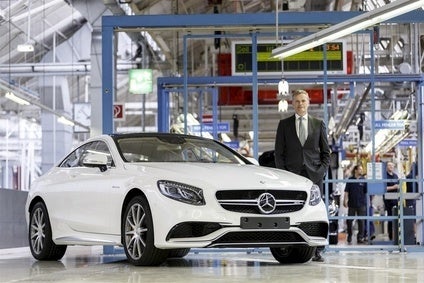
Mercedes-Benz is stepping up its international activities and strengthening its German plants with spending of more than EUR3bn (US$3.9bn) this year.
Some EUR1bn (US$1.3bn) is being poured into the Sindelfingen plant, primarily for future products. Another EUR1bn is being spent at the Untertürkheim core plant, to, amongst other things, expand engine production. Bremen plant’s capacities will be increased with a spend of around EUR750m (US$1bn) while further funds will go to Rastatt where the B-Class electric drive has been integrated into series production.

Discover B2B Marketing That Performs
Combine business intelligence and editorial excellence to reach engaged professionals across 36 leading media platforms.
Markus Schäfer, board member for production and supply chain management, said the investments were part of a realignment of Mercedes-Benz global passenger cars manufacturing activities.
He said: “We want to continue to grow and will significantly increase our production capacities in the coming years. At the same time we want to permanently and sustainably strengthen our competitiveness with a high-performance organisation.”
This year, Mercedes is managing 18 vehicle launches at eight locations worldwide, among them the start of production of the latest C-Class sedan on four continents. By 2020, the brand will have added 12 new models.
Schäfer said the new manufacturing organisation, Mercedes-Benz Operations (MO), was based on global production networks and centralised responsibility for logistics and quality.
“Under our previous production structure, the individual plants operated largely autonomously. Now, manufacturing will be organised according to product architectures, independent of individual locations.”
These product architectures are rear-wheel drive (MRA), front wheel drive (MFA), SUVs (MHA) and sports cars (MSA) as well as powertrain (MPA).
The MRA production network (S-, E-, C-Class) is headed by Andreas Kellermann, previously in charge of the Bremen plant. Michael Göbel is now running global compact car production (A-, B-Class, CLA, GLA and future CLA Shooting brake), having previously overseen roadster production in Bremen. Production of SUVs (M-, R-, GL- and G-Class) and sports cars (SL, SLK) is the responsibility of Jason Hoff, who also retains his existing role as president and CEO of the Mercedes plant in Alabama. Peter Schabert remains as head of global powertrain production.
Each vehicle and powertrain architecture will draw on a system of modules and components with the new C-Class the first to be built under this principle. This model went into production on four continents within six months earlier this year: Bremen was first in February, followed by East London (South Africa) in May, US in June, and the BBAC plant in Beijing (China) in July.
Bremen is the lead plant, managing all aspects of C-Class production, including tooling strategy, quality assurance and training. Around 500 employees from plants outside Germany have received training which they pass on in their home plants.
Schäfer said innovative manufacturing processes are also part of quality management: “It means our designers and developers are able to launch exceptional vehicles that are equipped with leading technologies.”
He added that there was still potential for reducing cost and improving efficiency through centralised supply chain management. Global production networks bring Mercedes closer to the different markets and customers and enable it to respond more quickly to changes in demand, because production can be adjusted in individual plants. At the same time, manufacturing in other currency areas enable exchange rate volatility to be evened out.
“Given the expanding range of models, steadily increasing unit figures, and greater complexity than ever before, we have to become significantly more flexible.”
This includes different variants on the same assembly line, factory equipment used for several vehicle generations and working hours varied depending on demand. By standardising and modularising its plants, Mercedes-Benz intends to contain the level of capital expenditure needed and reduce fixed costs.
“It is essential that we achieve continuous improvement in all disciplines and raise our productivity,” said Schäfer.
There were further benefits to be had through alliances with other carmakers. At the end of June, Daimler announced that it was setting up a production joint venture with the Renault-Nissan alliance, stepping up the existing cooperation.
The partners plan to build a new generation of compact cars at a factory in Aguascalientes, Mexico, which will have a total annual production capacity of 300,000 units.






